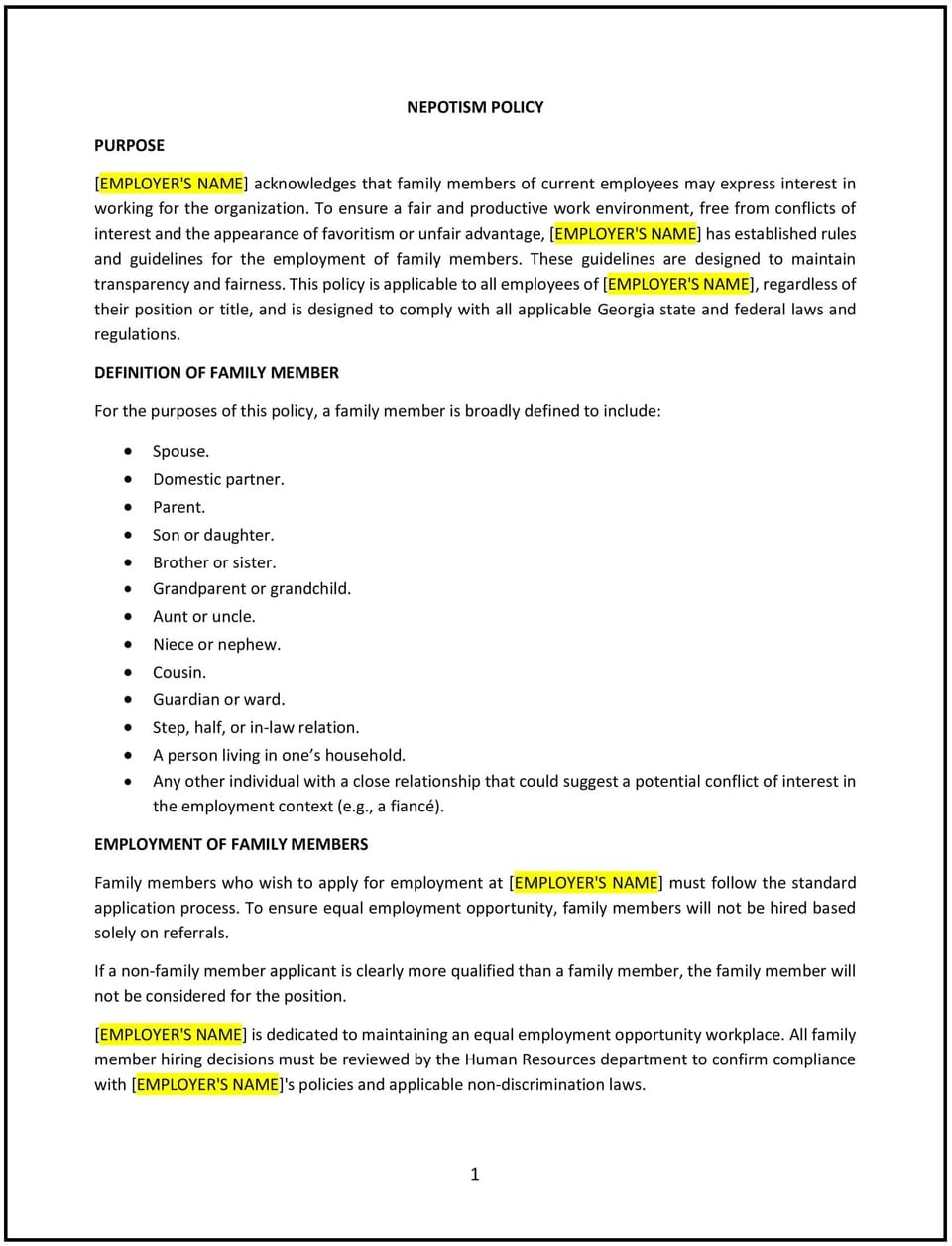Nepotism policy (Georgia): Free template

Nepotism policy (Georgia)
This nepotism policy is designed to help Georgia businesses establish clear guidelines for managing situations where employees have personal or familial relationships within the organization. The policy outlines expectations, conflict management procedures, and steps to maintain fairness and professionalism in the workplace.
By implementing this policy, businesses can promote equity, prevent favoritism, and protect organizational integrity.
How to use this nepotism policy (Georgia)
- Define nepotism: Clearly explain what constitutes nepotism, such as hiring, promoting, or supervising family members or close relations.
- Establish disclosure requirements: Require employees to disclose personal or familial relationships that could create conflicts of interest.
- Prohibit direct reporting relationships: Ensure family members do not work in roles where one directly supervises or influences the other’s employment terms.
- Address hiring and promotion practices: Include safeguards to ensure hiring and promotion decisions are based on merit and not influenced by personal relationships.
- Provide conflict resolution procedures: Outline steps for addressing disputes or perceived favoritism related to personal relationships.
- Monitor workplace dynamics: Regularly review situations involving familial relationships to identify and mitigate potential issues.
- Maintain confidentiality: Emphasize that disclosures will be handled discreetly and that no employee will face retaliation for complying with the policy.
- Review and update regularly: Periodically assess the policy to reflect changes in Georgia business practices, workforce dynamics, or organizational needs.
Benefits of using this nepotism policy (Georgia)
Implementing this policy provides several advantages for Georgia businesses:
- Promotes fairness: Ensures hiring and promotion decisions are based on qualifications and performance.
- Prevents conflicts: Clear guidelines reduce the risk of perceived or actual favoritism in the workplace.
- Protects employee morale: Transparent practices foster trust and equity among employees.
- Maintains professionalism: Managing relationships appropriately upholds organizational standards and reduces workplace tensions.
- Reflects Georgia-specific values: Tailoring the policy to local workplace norms and practices enhances its relevance and effectiveness.
Tips for using this nepotism policy (Georgia)
- Communicate openly: Share the policy with employees and provide guidance on disclosure requirements during onboarding and reviews.
- Train managers: Equip supervisors with tools to address nepotism-related concerns and uphold fair practices.
- Monitor hiring practices: Regularly review recruitment and promotion processes to identify and address potential biases.
- Act promptly: Address conflicts or concerns related to nepotism swiftly and fairly to maintain workplace harmony.
- Update periodically: Adjust the policy as needed to reflect changes in organizational priorities or workforce dynamics.
Q: What relationships are covered under this policy?
A: The policy typically includes immediate family members, such as spouses, parents, children, siblings, and other close relatives, but businesses should define this clearly.
Q: Are family members allowed to work in the same organization?
A: Yes, but family members should not be in roles where one has direct influence over the other’s hiring, promotion, or disciplinary actions.
Q: What steps should businesses take if nepotism is suspected?
A: Businesses should investigate the situation, review relevant policies, and take corrective actions if necessary to resolve conflicts or address favoritism.
Q: How can businesses ensure fairness in hiring when relatives of employees apply?
A: Businesses should follow standardized recruitment processes, using objective criteria to evaluate all candidates equally.
Q: What happens if an employee fails to disclose a personal relationship?
A: Employees should be encouraged to disclose relationships promptly, and businesses may take disciplinary action if nondisclosure leads to conflicts or policy violations.
Q: How often should this policy be reviewed?
A: The policy should be reviewed annually or as needed to address changes in Georgia workplace practices or organizational goals.
Q: Can employees report concerns about nepotism anonymously?
A: Yes, businesses should provide a confidential reporting mechanism to address concerns about nepotism or favoritism.
This article contains general legal information and does not contain legal advice. Cobrief is not a law firm or a substitute for an attorney or law firm. The law is complex and changes often. For legal advice, please ask a lawyer.


